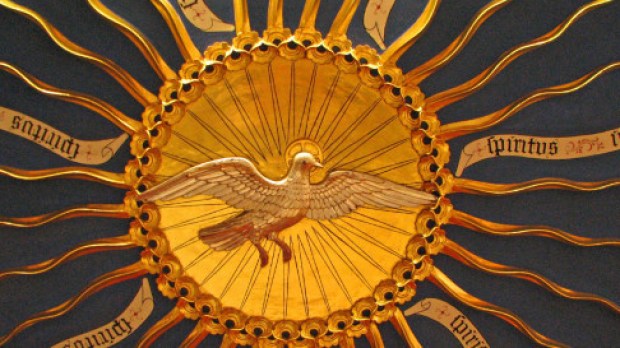When the time for Pentecost was fulfilled, they were all in one place together… Then there appeared to them tongues as of fire, which parted and came to rest on each one of them. And they were all filled with the Holy Spirit and began to speak in different tongues, as the Spirit enabled them to proclaim.” —Acts 2:1, 4
Jesus had promised his Apostles that “the Advocate, the Holy Spirit whom the Father will send in my name, will teach you everything and remind you of all that I told you” (John 14:26). The first Christians experienced the fulfillment of this promise as the Spirit of God came upon them that first Pentecost in wind, fire, and voice (cf. Acts 2:1-4). We should remember, though, that what began at Pentecost continues in our own day because, while the Spirit does not always come in great signs and wonders as it did for Mary and the Apostles, the Holy Spirit is always present and active in individuals hearts and in the life of the Church.
Centuries ago, a Desert Father now simply known as “Pseudo-Macarius” wrote:
“The heart directs and governs all the organs of the body. And when grace pastures the heart, it rules over all the members and the thoughts. For there, in the heart, the mind abides as well as all of the thoughts of the soul and its hopes. This is how grace penetrates throughout all the parts of the body.”
Pseudo-Macarius understood that the heart is that place where a person’s spirit and the Spirit of God exist together. The mind, the seat of rational thought, is made complete when it abides in the heart and becomes enlightened by “all the thoughts of the soul and all its hopes.” Although our mind is an essential part of who we are, we are only at our best when our minds and hearts move together.
This unity of mind and heart—a unity that brings individuals together in bonds of faith and love—is at the heart of our Pentecost celebration.
Although it is an element that is often overlooked, the great gift of Pentecost was a restoration of lost unity. Reversing the disunity and confusion that began at the Tower of Babel (cf. Genesis 11:1-9), at Pentecost each believer spoke a language that those present heard as their own (Acts 2:5-8).
In this powerful sign, the Spirit made use of human instruments in a way that foretold a future in which all humanity would sing God’s praises in one voice. And we know that the Spirit that binds us all together in praise also enriches us with a diversity of gifts. This diversity is essential to the life and health of the Church. If we fall into the trap of equating unity with uniformity then we are, as it were, restricting the work of the Spirit.
St. Paul reminds us that,
There are different kinds of spiritual gifts but the same Spirit; there are different forms of service but the same Lord; there are different workings but the same God who produces all of them in everyone. To each individual the manifestation of the Spirit is given for some benefit (1 Corinthians 12:4-7).
Pentecost is a celebration of possibilities, both for individual believers and for the Church. The Pentecost of the first Christians was a witnessing of the power of the Spirit for the future.
This future is lived out in each of us in the little moments of our lives, when we allow ourselves to be led by the Spirit. By being open to the Spirit, individually and communally, we can celebrate legitimate diversity based on giftedness and vocation and we can live a unity that is not afraid of questions, doubts, challenges, and possibilities. We are led outside of ourselves for the sake of others. St. Paul reminds us that not all will speak in tongues, but each person, with unique gifts, is essential to the Church.
As individual believers and as a Church we have to seek out and heal those wounds that threaten the body of humanity and the body of Christ. Fear, discrimination, war, disregard for life, bullying, and exploitation are among the many, many forces of evil that lead people away from community and into loneliness and isolation.
If the gifts we have received are for the common good, then our Pentecost mission is to share our gifts and spend ourselves nurturing others, drawing them into the unity of the Spirit and the Church, and to open ourselves to the workings of the Spirit in the diversity of the gifts and lives of others.
How does the diversity of gifts and perspectives within the Church inspire your faith?What gifts has the Holy Spirit given you to empower you to help build up the Church?When have you been blessed through the ministry and service of others? When has the kindness of others helped you feel less alone or isolated?
Words of Wisdom: “No heights of oratory, no flaming enthusiasm, could have awakened for Christ the thousands who were moved at the time, or produced the life-unity of the early Church. The Spirit did not, as you might think, descend upon the speakers in such a way that they preached a sermon or gave a speech to an unenlightened crowd. Instead, fiery tongues of the Spirit ate their way into the hearts of the hearers and inflamed the crowds in one common experience of the same Spirit and the same Christ.”—Eberhard Arnold in Innerland: A Guide into the Heart of the Gospel

